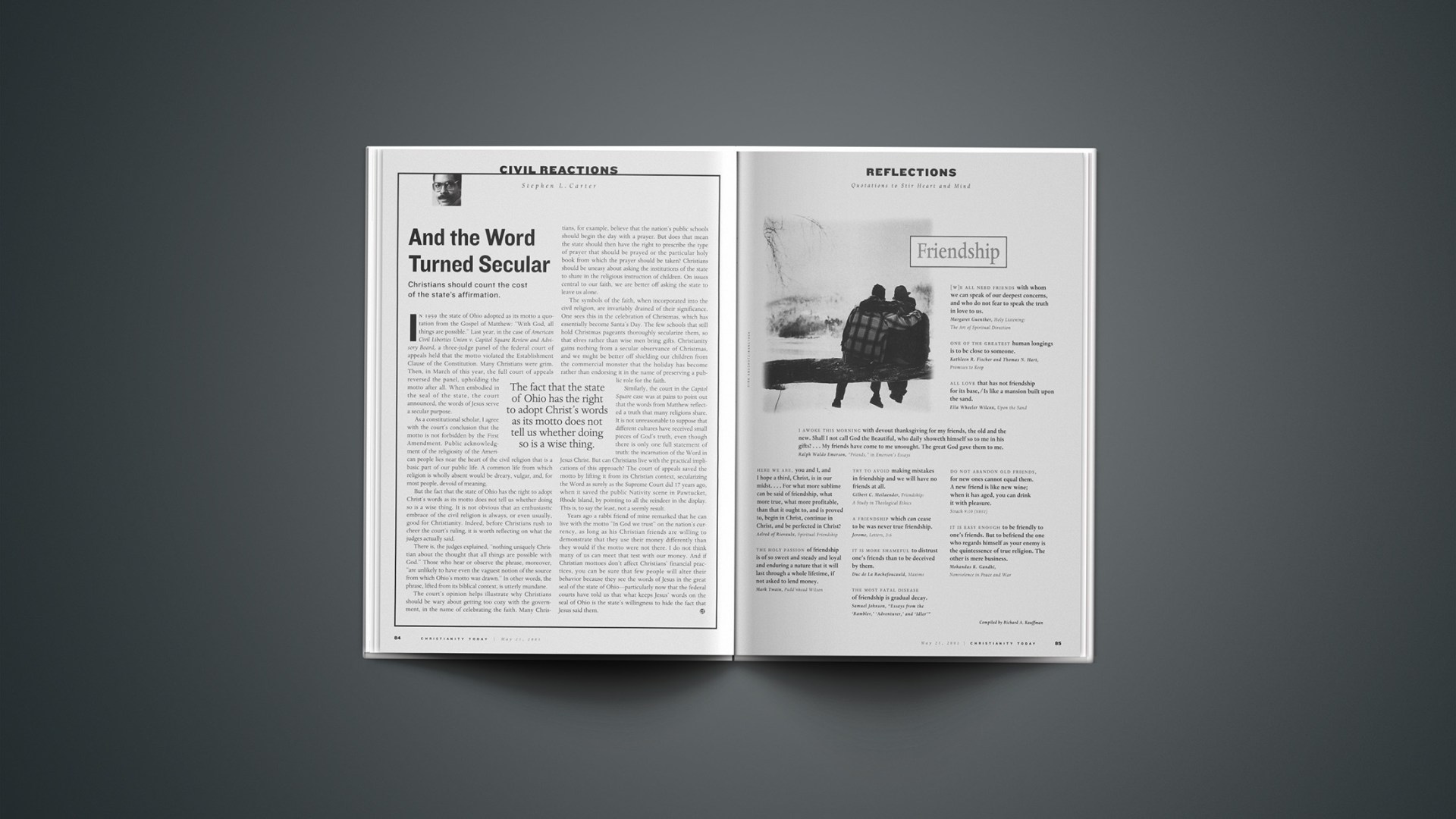As a constitutional scholar, I agree with the court’s conclusion that the motto is not forbidden by the First Amendment. Public acknowledgment of the religiosity of the American people lies near the heart of the civil religion that is a basic part of our public life. A common life from which religion is wholly absent would be dreary, vulgar, and, for most people, devoid of meaning.
But the fact that the state of Ohio has the right to adopt Christ’s words as its motto does not tell us whether doing so is a wise thing. It is not obvious that an enthusiastic embrace of the civil religion is always, or even usually, good for Christianity. Indeed, before Christians rush to cheer the court’s ruling, it is worth reflecting on what the judges actually said.
There is, the judges explained, “nothing uniquely Christian about the thought that all things are possible with God.” Those who hear or observe the phrase, moreover, “are unlikely to have even the vaguest notion of the source from which Ohio’s motto was drawn.” In other words, the phrase, lifted from its biblical context, is utterly mundane.
The court’s opinion helps illustrate why Christians should be wary about getting too cozy with the government, in the name of celebrating the faith. Many Christians, for example, believe that the nation’s public schools should begin the day with a prayer. But does that mean the state should then have the right to prescribe the type of prayer that should be prayed or the particular holy book from which the prayer should be taken? Christians should be uneasy about asking the institutions of the state to share in the religious instruction of children. On issues central to our faith, we are better off asking the state to leave us alone.
The symbols of the faith, when incorporated into the civil religion, are invariably drained of their significance. One sees this in the celebration of Christmas, which has essentially become Santa’s Day. The few schools that still hold Christmas pageants thoroughly secularize them, so that elves rather than wise men bring gifts. Christianity gains nothing from a secular observance of Christmas, and we might be better off shielding our children from the commercial monster that the holiday has become rather than endorsing it in the name of preserving a public role for the faith.
Similarly, the court in the Capitol Square case was at pains to point out that the words from Matthew reflected a truth that many religions share. It is not unreasonable to suppose that different cultures have received small pieces of God’s truth, even though there is only one full statement of truth: the incarnation of the Word in Jesus Christ. But can Christians live with the practical implications of this approach? The court of appeals saved the motto by lifting it from its Christian context, secularizing the Word as surely as the Supreme Court did 17 years ago, when it saved the public Nativity scene in Pawtucket, Rhode Island, by pointing to all the reindeer in the display. This is, to say the least, not a seemly result.
Years ago a rabbi friend of mine remarked that he can live with the motto “In God we trust” on the nation’s currency, as long as his Christian friends are willing to demonstrate that they use their money differently than they would if the motto were not there. I do not think many of us can meet that test with our money. And if Christian mottoes don’t affect Christians’ financial practices, you can be sure that few people will alter their behavior because they see the words of Jesus in the great seal of the state of Ohio—particularly now that the federal courts have told us that what keeps Jesus’ words on the seal of Ohio is the state’s willingness to hide the fact that Jesus said them.
Copyright © 2001 Christianity Today. Click for reprint information.
Related Elsewhere
The rulings of the three-judge panel (which said the motto was unconstitutional) and the full court of appeals (which approved the motto) are available online.Local coverage of the decision is available from The Cincinnati Post (which also editorialized, “This is a time to celebrate”), The Cincinnati Enquirer, and The Cleveland Plain Dealer.
Christianity Today‘s Weblog covered bothdecisions.
“When something becomes a rallying point for a cause or an identifying symbol for a movement,” Christianity Today recently editorialized (regarding the posting of the Ten Commandments in schools), “it runs the danger of becoming an idol.”
Earlier Christianity Today columns by Stephen L. Carter include:
Vouching for Parents | Vouchers are not an attack on public schools but a vote of trust in families. (Apr. 2, 2001)
The Courage to Lose | In elections, and in life, there is something more important than winning. (Feb. 6, 2001)










